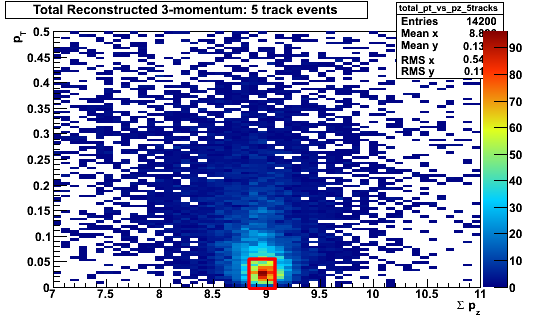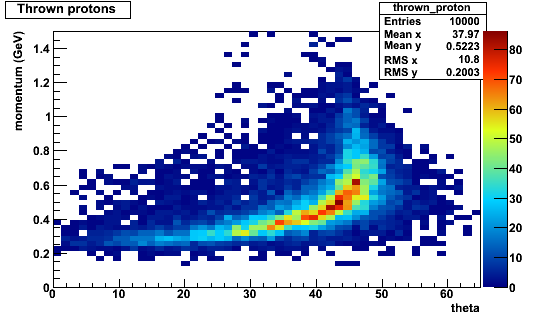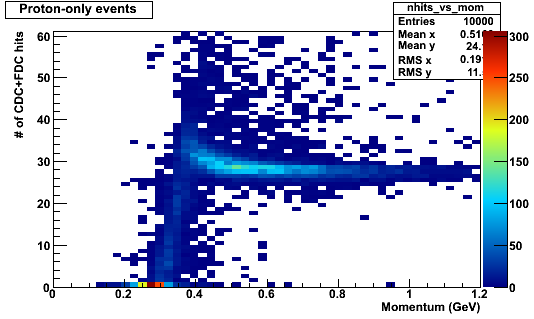Difference between revisions of "Kinematic fitting charged particles 11/16/11"
(→Proton reconstruction) |
|||
| (10 intermediate revisions by the same user not shown) | |||
| Line 1: | Line 1: | ||
| − | Looking at an all charged particle final state to study the state of the tracking code: \gamma p -> pi+ pi+ pi- pi- p | + | ==Reaction== |
| + | Looking at an all charged particle final state to study the state of the tracking code: \gamma p -> pi+ pi+ pi- pi- p. | ||
| + | |||
| + | *50,000 events | ||
| + | *svn revision 8540 | ||
| + | ==Kinematic fit== | ||
| + | All combinations of track hypotheses that produce the correct final state are kinematically fit. Constraint is overall conservation of 4-momentum. | ||
| + | |||
| + | *41% of events have sufficient particles (>=3 positive tracks, >=2 negative tracks) | ||
| + | *Of these, 9% have kinematic fit confidence level>1% (4% of total events) | ||
| + | |||
| + | |||
| + | |||
| + | ==3-momentum== | ||
| + | Kinematic fit is dependent on errors, PID. Try to simplify things... | ||
| + | |||
| + | Look at events with exactly 5 tracks (3 positive, 2 negative) and look at sum of reconstructed 3-momentum from all tracks. | ||
| + | |||
| + | 28% of events have exactly 5 tracks | ||
| + | |||
| + | [[Image:Pt_vs_pz.png]] | ||
| + | |||
| + | 2400 events in region outlined in red. | ||
| + | |||
| + | ==Proton reconstruction== | ||
| + | * svn rev. 8574 | ||
| + | |||
| + | Distribution of thrown protons in events: | ||
| + | |||
| + | [[File:Thrown protons.png]] | ||
| + | |||
| + | Look at sample of proton-only events with same momentum distribution. | ||
| + | |||
| + | [[File:Proton only.png]] | ||
| + | |||
| + | Protons with p<300 MeV/c are not detected, those with p>450 MeV/c almost always have sufficient hits. | ||
| + | |||
| + | Full event (5 particle final state) sample: | ||
| + | * Examine only events with proton p>450 MeV (57% of total events) | ||
| + | * 66% of events have good proton hit selection (all hits associated with proton hypothesis from proton track) | ||
| + | * Of these events, only 54% have good fit (confidence level from tracking chi^2 > 1%) | ||
Latest revision as of 12:29, 29 November 2011
Reaction
Looking at an all charged particle final state to study the state of the tracking code: \gamma p -> pi+ pi+ pi- pi- p.
- 50,000 events
- svn revision 8540
Kinematic fit
All combinations of track hypotheses that produce the correct final state are kinematically fit. Constraint is overall conservation of 4-momentum.
- 41% of events have sufficient particles (>=3 positive tracks, >=2 negative tracks)
- Of these, 9% have kinematic fit confidence level>1% (4% of total events)
3-momentum
Kinematic fit is dependent on errors, PID. Try to simplify things...
Look at events with exactly 5 tracks (3 positive, 2 negative) and look at sum of reconstructed 3-momentum from all tracks.
28% of events have exactly 5 tracks
2400 events in region outlined in red.
Proton reconstruction
- svn rev. 8574
Distribution of thrown protons in events:
Look at sample of proton-only events with same momentum distribution.
Protons with p<300 MeV/c are not detected, those with p>450 MeV/c almost always have sufficient hits.
Full event (5 particle final state) sample:
- Examine only events with proton p>450 MeV (57% of total events)
- 66% of events have good proton hit selection (all hits associated with proton hypothesis from proton track)
- Of these events, only 54% have good fit (confidence level from tracking chi^2 > 1%)


